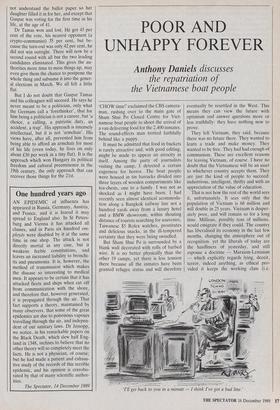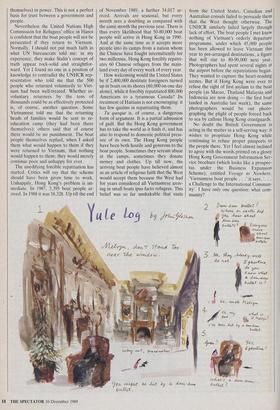POOR AND UNHAPPY FOREVER
Anthony Daniels discusses
the repatriation of the Vietnamese boat people
`CHOW time!' exclaimed the CBS camera- man, rushing over to the main gate of Sham Shui Po Closed Centre for Viet- namese boat people to shoot the arrival of a van delivering food for the 2,400 inmates. The sound-effects man trotted faithfully behind like a puppy.
It must be admitted that food in buckets is rarely attractive and, with good editing, might be made to appear an atrocity in itself. Among the party of journalists visiting the camp, I detected a certain eagerness for horror. The boat people were housed in tin barracks divided into three layers of wooden compartments like tea-chests, one to a family. I was not as shocked as I might have been: I had recently seen almost identical acommoda- tion along a Bangkok railway line not a hundred yards away from a luxury hotel and a BMW showroom, within shouting distance of tourists searching for souvenirs, Taiwanese $5 Rolex watches, prostitutes and delicious snacks, in the ill-tempered certainty that they were being swindled.
But Sham Shui Po is surrounded by a blank wall decorated with rolls of barbed wire. It is no better physically than the other 19 camps, yet there is less tension there because all the inmates have been granted refugee status and will therefore
eventually be resettled in the West. This means they can view the future with optimism and answer questions more or less truthfully: they have nothing now to prove.
They left Vietnam, they said, because there was no future there. They wanted to learn a trade and make money. They wanted to be free. They had had enough of communism. These are excellent reasons for leaving Vietnam, of course. I have no doubt that the Vietnamese will be an asset to whichever country accepts them. They are just the kind of people to succeed: industrious, intelligent, thrifty and with an appreciation of the value of education.
That is not how the rest of the world sees it, unfortunately. It sees only that the population of Vietnam is 68 million and will double in 25 years. Vietnam is desper- ately poor, and will remain so for a long time. Millions, possibly tens of millions, would emigrate if they could. The country has liberalised its economy in the last few months, changing the atmosphere out of recognition. yet the liberals of today are the hardliners of yesterday, and still espouse a doctrine — Marxism-Leninism — which explicitly regards lying, deceit, terror, indeed anything, as ethical pro- vided it keeps the working class (i.e.
'I'll get back to you in a minute — I think I've got a bad line.'
themselves) in power. This is not a perfect basis for trust between a government and people.
Nevertheless the United Nations High Commission for Refugees' office in Hanoi is confident that the boat people will not be persecuted if they return to Vietnam. Normally, I should not put much faith in what UN bureaucrats told me: in my experience, they make Stalin's concept of truth appear rock-solid and straightfor- ward. Yet I found no one in a position of knowledge to contradict the UNHCR rep- resentative who told me that the 500 people who returned voluntarily to Viet- nam had been well-treated. Whether in- voluntary returnees by the tens of thousands could be as effectively protected is, of course, another question. Some Vietnamese told me that the returning heads of families would be sent to re- education camp (they had been there themselves); others said that of course there would be no punishment. The boat people themselves replied, when I asked them what would happen to them if they were returned to Vietnam, that nothing would happen to them; they would merely continue poor and unhappy for ever.
The unedifying forcible repatriation has started. Critics will say that the scheme should have been given time to work. Unhappily, Hong Kong's problem is im- mediate. In 1987, 3,395 boat people ar- rived. In 1988 it was 18,328. Up till the end of November 1989, a further 34,017 ar- rived. Arrivals are seasonal, but every month sees a doubling as compared with the same month the previous year. There is thus every likelihood that 50-80,000 boat people will arrive in Hong Kong in 1990. And at the same time as it accepts more people into its camps from a nation whom the Chinese have fought intermittently for two millennia, Hong Kong forcibly repatri- ates 60 Chinese refugees from the main- land every day of every week of every year.
How welcoming would the United States be if 2,400,000 destitute foreigners turned up in boats on its shores (60,000 on one day alone), while it forcibly repatriated 800,000 Americans to a tyrannous Canada? Its treatment of Haitians is not encouraging: it has few qualms in repatriating them.
Tu quoque is, of course, a dangerous form of argument. It is a partial admission of guilt. But the Hong Kong government has to take the world as it finds it, and has also to respond to domestic political press- ure of its own. The Hong Kong people have been both hostile and generous to the boat people. Sometimes they scream abuse at the camps, sometimes they donate money and clothes. Up till now, the arriving boat people have believed almost as an article of religious faith that the West would accept them because the West had for years considered all Vietnamese arriv- ing in small boats ipso facto refugees. This belief was so far unshakable that visits from the United States, Canadian and Australian consuls failed to persuade them that the West thought otherwise. The UNHCR similarly failed largely through lack of effort. The boat people I met knew nothing of Vietnam's orderly departure programme, under which 45,000 people has been allowed to leave Vietnam this year to pre-arranged destinations, a figure that will rise to 80-90,000 next year. Photographers had spent several nights at the airport before the repatriations began. They wanted to capture the heart-rending scenes. But if Hong Kong were ever to refuse the right of first asylum to the boat people (as Macao, Thailand Malaysia and Indonesia are now doing — the first boat landed in Australia last week), the same photographers would be out photo- graphing the plight of people forced back to sea by callous Hong Kong coastguards.
No doubt the British Government is acting in the matter in a self-serving way: it wishes to propitiate Hong Kong while continuing to refuse proper passports to the people there. Yet I feel almost inclined to agree with the words printed on a glossy Hong Kong Government Information Ser- vice brochure (which looks like a prospec- tus under the Business Expansion Scheme), entitled Voyage to Nowhere. `Vietnamese boat people . .' it says, `. . a Challenge to the International Commun- ity'. I have only one question: what com- munity?



















































 Previous page
Previous page